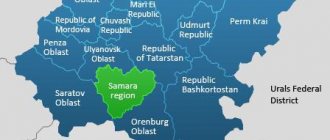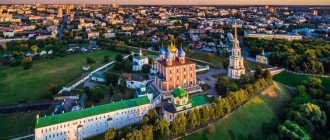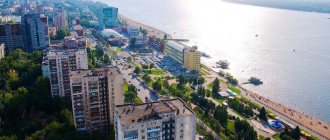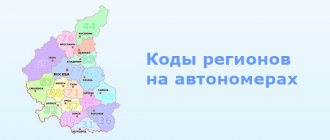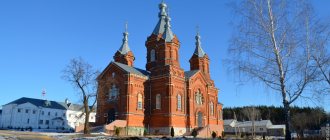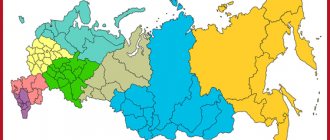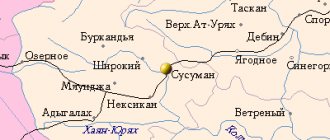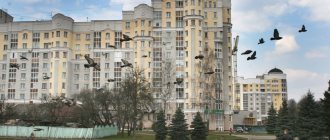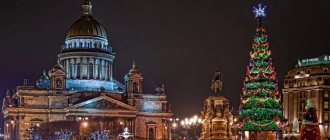Initially, all regional automobile codes were two-digit and coincided with the numbers of regions (from 01 to 89) - subjects of the Russian Federation according to their order in the Constitution of the Russian Federation (Article 65, paragraph 1) as amended at the time of the creation of the standard for state automobile license plates, effective from 1 January 1994. But with the growth of the country’s vehicle fleet and changes in the list of constituent entities of the Russian Federation, the need for additional codes, including three-digit ones, arose. In this article, we have collected all the existing codes on Russian license plates and which region is assigned to them.
Previously, it was believed that three-digit codes with only numbers 1 and 7 (they are the narrowest) would fit on a license plate, so only them were used (this was legalized). A new three-digit region code was formed from the old one by adding the number 1 or 7 to the beginning (from 63 163 were “born”, then 763). Then it suddenly became clear that any numbers fit, and in 2022 a law was passed allowing the use of numbers 1-9 in three-digit codes of regions of the Russian Federation (link to the law).
Any area code allows for the use of no more than 1,726,272 number combinations. The restriction is caused by the ban on using letters other than A, B, E, K, M, N, O, R, S, T, U and X for series (the reason is that they are written the same in Cyrillic and Latin).
Kia Sorento with license plates 797 region (Moscow)
What holiday is it today?
January 22, 2022, Saturday
Today are holidays, events: Day of Unification of Ukraine Tomorrow: Premiere of the opera “Eugene Onegin” at the Bolshoi Theater
Today is the Orthodox holiday: Martyr Polyeuctus. St. Philip, Metropolitan of Moscow and All Russia, wonderworker... Tomorrow: St. Gregory, Bishop of Nyssa. Venerable Markian the presbyter. Venerable Dometian, Bishop of Melitino. St. Paul of Komel, wonderworker, student of St. Sergius of Radonezh. Saint Theophan, the Recluse of Vyshensky...
Today is a national holiday: St. Philip's Day... Tomorrow: Gregory - Summer Guide...
Regions with multiple license plate codes
- Altai region - 22, 122
- Volgograd region - 34, 134
- Kemerovo region - 42, 142
- Kaluga region - 40, 140
- Krasnodar region - 23, 93, 123, 193
- Krasnoyarsk region - 24, 124
- Leningrad region - 47, 147
- Moscow - 77, 97, 99, 177, 197, 199, 777, 797, 799
- Moscow region - 50, 90, 150, 190, 750, 790
- Nizhny Novgorod Region - 52, 152
- Novosibirsk region - 54, 154
- Orenburg region - 56, 156
- Perm region - 59, 81, 159
- Primorsky Krai - 25, 125
- Republic of Bashkortostan - 02, 102, 702
- Republic of Tatarstan - 16, 116, 716
- Rostov region - 61, 161, 761
- Samara Region - 63, 163, 763
- Saint Petersburg - 78, 98, 178, 198
- Sverdlovsk region - 66, 96, 196
- Tyumen region - 72, 172
- Khanty-Mansiysk Autonomous Okrug - 86, 186
- Chelyabinsk region - 74, 174, 774
- Chechen Republic - 20, 95
Volkswagen Polo with region code 799
Seasons
Seasons, four periods of the year (spring, summer, autumn and winter) characterized by certain average temperatures. The period during which the Sun passes through one of these sectors is called the season. Spring in the Northern Hemisphere and autumn in the Southern Hemisphere begin when the Sun passes through the initial circle of declination and its right ascension is 0° (vernal equinox). Summer in the Northern Hemisphere and winter in the Southern Hemisphere occur when the sun's right ascension is 90° (summer solstice). Autumn in the Northern Hemisphere and spring in the Southern Hemisphere begin when the sun's right ascension is 180° (autumnal equinox). The beginning of winter in the Northern Hemisphere and summer in the Southern Hemisphere is considered to be the winter solstice, when the direct ascension of the Sun is 270°... Next: Seasons. Russian folk calendar. Monthly words...
Folk calendar about every day
Every day one season always replaces another and this determines a person’s way of life. In connection with this, a folk calendar was formed in which there were practically no nameless, unmarked days. Every day was special, had its own purpose. All this was determined by climate conditions and astrological phenomena.
A calendar is a system for counting periods of time. The first calendars arose a long time ago, in ancient times, because there was a need to measure time. The word calendar comes from the Latin words caleo - to proclaim and calendarium - debt book. This is due to the fact that in Ancient Rome the beginning of each month was especially proclaimed, and because it was customary to pay debts on the first day of the month. Different peoples counted time differently. Some calendars are based on the changing phases of the moon - lunar calendars; in others - the change of seasons - sunny; in others, the length of the year was coordinated with the change of seasons, and the counting of months was associated with the phases of the Moon. Such calendars are called lunisolar.
In Rus', the calendar was called a monthly calendar. Every day, the month book covered the entire year of peasant life, “describing” day by day, month after month, where each day had its own holidays or weekdays, customs and superstitions, traditions and rituals, natural signs and phenomena. The cyclical nature of the calendar is reminiscent of human life, where spring is youth, summer is heyday, autumn is the time of harvesting fruits (it’s good if there are some, otherwise you can live your life without collecting fruits), winter is the time of wisdom and peace. This cyclicality and rhythm determined the way of life of the farmer. The folk calendar was an agricultural calendar, which was reflected in the names of the months, folk signs, rituals and customs. Even the determination of the timing and duration of the seasons is associated with real climatic conditions. Hence the discrepancy between the names of the months in different areas... Next: Folk calendar...
Outdated numbers of Russian regions on car signs
- 20 — the number was canceled in 2000 and replaced by code 95;
- 80 - belonged to the former Aginsky Buryat Autonomous Okrug, which became part of the Trans-Baikal Territory in 2008;
- 81 — this code belonged to the former Komi-Permyak Autonomous Okrug, since 2005 as part of the Perm Territory;
- 84 — the number was issued to the former Taimyr Autonomous Okrug, since 2007 it has been part of the Krasnoyarsk Territory;
- 85 - belonged to the former Ust-Orda Buryat Autonomous Okrug, since 2008 as part of the Irkutsk region;
- 88 — the number belonged to the former Evenki Autonomous Okrug, since 2007 as part of the Krasnoyarsk Territory;
- 91 — belonged to the Kaliningrad region and is used only on export transit numbers;
- 94 — the code was assigned to regions outside the Russian Federation and served by the country’s internal affairs bodies (for example, Baikonur).
Also, registration of numbers with the following region codes of the Russian Federation has already been stopped or is ending: 02, 16, 22, 23, 24, 25, 34, 40, 42, 47, 50, 52, 54, 59, 61, 63, 66, 74, 77, 78, 86, 90, 93, 96, 97, 98, 99, 102, 123, 150, 177, 190, 197, 199, 750, 777, 799.
Fishing calendar for every day
The fishing calendar should not be taken as an absolutely indisputable truth. Fish biting is greatly influenced by a whole range of natural factors, as well as the influence on the nature of man himself. You must not forget that the fish’s bite depends and is determined not only by the calendar dates and biological cycles of their life, reflected in the calendar, but also, no less, by the state of their habitat; the bite also depends on weather conditions: air and water temperatures, cloudiness, wind direction and strength, etc... Next: Fishing calendar...
Region 86 registration plates
To streamline and record Russian cars, it was decided to introduce registration plates. These are special standardized signs, their appearance is determined by GOST. Combinations on them are designated according to the principle: three numbers and three letters. In this case, letters indicate the serial number, and numbers indicate the license plate itself. The letters used are Latin. The license plate of the owner of a vehicle in KhMAO-Yugra looks standard.
In the lower right corner of the license plate there is a flag of the Russian Federation, as well as the letter combination RUS. In the upper right corner, above the flag and letter combination, there is the number 86, indicating the code of the subject registered in the Khanty-Mansiysk Okrug. In this case, the letters and numbers of the code are slightly smaller than the font of the main numbers of the license plate.
Orthodox calendar about every day
Orthodox calendar: Orthodox, Church and Christian holidays.
The church year is an alternation of weekdays and holidays. On weekdays, a person is called to work “by the sweat of his brow to earn his bread.” Holidays are given in order to feel liberation, to rise above the bustle and routine of the world, to feel involved in the highest of worlds, “where there are no illnesses, sorrows and sighs, but endless life.” Since ancient times, holiday cycles have been associated with the seasons. The pagans associated them with the worship of the forces of nature, the cult of which in the Old Testament was replaced by gratitude to the Creator for the universe. And although the connection between holidays and the seasons has not completely lost its power, since God is present in everything, in the plant and animal world, in human works, it nevertheless faded into the background, giving way to a spiritual foundation built on the Sacred Scriptures. The history of Orthodox holidays dates back to the times of the Old Testament. Each of the Orthodox holidays is dedicated to the remembrance of the most important events in the life of Jesus Christ and the Mother of God, as well as the memory of saints... Next: Orthodox calendar...
Russian folk calendar for every day
The word “sign” comes from the word “notice”, i.e. observe. As a result of observing what happens around a person every day, he accumulates life experience. This knowledge was passed down from generation to generation, carefully preserved and people trusted it as a sacred book. Many signs have come to us from the depths of centuries without losing their knowledge. Each of us is free to choose: to dismiss all this as an absurd superstition or to take a closer look at the signs and take the centuries-old experience of generations more seriously. Most of us, when taking exams, ask them to scold them, boasting about some kind of good fortune or luck, spit so as not to jinx them or knock on wood, take a detour if a black cat crossed the road, are afraid of the number 13 and much more. And who among us does not have lucky things, numbers? Who has never resorted to the help of fate at least once in their life, who has not believed in secrets? It’s as if everything connected with signs is hidden somewhere deep in our subconscious. Often we remember them mechanically, unconsciously, or just as a joke. But, undoubtedly, the signs contain a lot of accurate knowledge and practical wisdom of our ancestors. They cover all the characteristic, often difficult to perceive, natural phenomena. Signs have preserved a lot of what was in old folk holidays and customs; they help predict the weather, grow crops... Next: Folk signs...
Holiday calendar, dates and events of the year
All state and professional holidays in Russia, including significant World and International holidays, and other equally interesting holidays and events about every day.
The holiday has always kept pace with the history of mankind. Social time can be divided into three types: everyday life (weekdays), weekends and holidays. Everyday life is a series of practices repeated day after day and every day (work). Weekends are regular breaks from the rush of everyday life. It is believed that on weekends a person should restore his strength after working days. Day off, non-working day. A holiday is a day of celebration established in honor or in memory of someone or something. A day or series of days celebrated by the church in memory of a religious event or saint... Next: Calendar...
Which federal district does the Moscow region belong to?
Russia consists of eight federal districts - large associations of Russian regions. Moscow is part of the Central District , and it is its official center. It also includes Kaluga, Tver, Ryazan, Smolensk, Tambov and a number of other regions.
But Moscow is not included in the Moscow region - these are two different regions of Russia.
Prayer book, Orthodox prayers for every day
Prayer is the most powerful means for healing all illnesses - both physical and mental. Prayers can be laudatory or grateful, petitionary and repentant. If we have offended God, sinned, we must ask Him for forgiveness, that is, repent. Such prayers are called repentant prayers. If everything is fine with us, if we and our loved ones are healthy and prosperous, if we have a place to live, something to wear, something to eat, we must glorify and thank God for this. Such prayers are called praise or thanksgiving. If some misfortune, illness, trouble or need happens, you need to ask God for help. Such prayers are called petitionary... Next: Orthodox prayers...
Zodiac, astrological, eastern calendar. Zodiac signs
In ancient times, to establish the calendar, priests used knowledge of the positions of all the planets. Before the reform of Peter 1, the New Year was celebrated on the Day of the Autumn Equinox. On this day, according to ancient legend, the most peaceful treaty was concluded between the Great Race (ancient Slavs) and the Great Dragon (ancient Chinese) and it was approximately 7518 years ago... For the ancient Slavs, the calendar month corresponded to the lunar cycle from new moon to new moon, taking into account such Thus, the relationship of the entire annual cycle with astronomical and natural phenomena. There was no coherent calendar system. The main natural phenomena are still considered to this day to be the days of the solar equinox and solstice - the Slavic holidays Maslenitsa, Kupala, Ovsen and Kolyada. But during the time of Peter 1, all ancient Slavic calendars were abolished and a new Western European calendar from the Nativity of Christ (Julian calendar) was introduced, while the beginning of the calendar was moved to January 1. The Julian calendar (old style) did not take leap days into account and accumulated one extra day every 128 years. After the October Revolution in 1918, the Gregorian calendar (new style) was introduced in Russia, according to which an amendment of 13 days was introduced. The calendar of the ancient Slavs was based on two planets: the Sun and the Moon. And now they don’t use anything at all. The calendar has become static. There is no such thing as the calendar, it turns out, resting on some planet. Nobody even knows about it. There are just some standard numbers, there are months and holidays. The calendar is based on the Sun and Moon. Why is this so? Because these two luminaries influence the Earth. The Earth revolves around the Sun, and the Moon revolves around the Earth. And these two luminaries create the atmosphere on the planet. From here the calendar is built... Next: Astrological calendar...
Table of regions of Russia. List as of 2022
There are 85 regions in Russia, including 22 republics, 9 territories, 46 regions, 3 federal cities, 1 autonomous region, 4 autonomous districts (Nenets, Chukotka, Yamalo-Nenets and Khanty-Mansi Autonomous Okrug - Yugra).
There are also 86 positions on the lists - code 99 - Other territories, including the city and the Baikonur cosmodrome - are not a region of the Russian Federation.
List of regions alphabetically
| № | The subject of the Russian Federation | Flag | Territory (km²) | Population _ | Admin. center | Municipalities |
Republic | ||||||
| 1 | Adygea | 7792 | ↗453 376 | Maykop | 7 municipal districts, 2 city districts | |
| 2 | Altai | 92903 | ↗218 063 | Gorno-Altaisk | 10 municipal districts, 1 city district | |
| 3 | Bashkortostan | 142947 | ↘4 063 293 | Ufa | 54 municipal districts, 9 urban districts | |
| 4 | Buryatia | 351334 | ↗984 511 | Ulan-Ude | 21 municipal districts, 2 urban districts | |
| 5 | Dagestan | 50270 | ↗3 063 885 | Makhachkala | 42 municipal districts, 10 city districts | |
| 6 | Ingushetia | 3628 | ↗488 043 | Magas | 4 municipal districts, 4 city districts | |
| 7 | Kabardino-Balkaria | 12470 | ↗865 828 | Nalchik | 10 municipal districts, 3 city districts | |
| 8 | Kalmykia | 74731 | ↘275 413 | Elista | 13 municipal districts, 1 city district | |
| 9 | Karachay-Cherkessia | 14277 | ↘466 305 | Cherkessk | 10 municipal districts, 2 urban districts | |
| 10 | Karelia | 180520 | ↘622 484 | Petrozavodsk | 16 municipal districts, 2 city districts | |
| 11 | Komi | 416774 | ↘840 873 | Syktyvkar | 15 municipal districts, 5 urban districts | |
| 12 | Crimea | 26081 | ↗1 913 731 | Simferopol | 14 municipal districts, 11 city districts | |
| 13 | Mari El | 23375 | ↘682 333 | Yoshkar-Ola | 14 municipal districts, 3 city districts | |
| 14 | Mordovia | 26128 | ↘805 056 | Saransk | 22 municipal districts, 1 city district | |
| 15 | Sakha (Yakutia) | 3083523 | ↗964 330 | Yakutsk | 34 municipal districts, 2 urban districts | |
| 16 | North Ossetia Alania | 7987 | ↘701 765 | Vladikavkaz | 8 municipal districts, 1 city district | |
| 17 | Tatarstan | 67847 | ↗3 894 284 | Kazan | 43 municipal districts, 2 urban districts | |
| 18 | Tyva | 168604 | ↗321 722 | Kyzyl | 17 municipal districts, 2 city districts | |
| 19 | Udmurtia | 42061 | ↘1 513 044 | Izhevsk | 25 municipal districts, 5 city districts | |
| 20 | Khakassia | 61569 | ↘537 513 | Abakan | 8 municipal districts, 5 urban districts | |
| 21 | Chechnya | 15647 | ↗1 436 981 | Grozny | 17 municipal districts, 2 city districts | |
| 22 | Chuvashia | 18343 | ↘1 231 117 | Cheboksary | 21 municipal districts, 5 urban districts | |
| The edges | ||||||
| 23 | Altai region | 167996 | ↘2 350 080 | Barnaul | 60 municipal districts, 11 city districts | |
| 24 | Transbaikal region | 431892 | ↘1 072 806 | Chita | 31 municipal districts, 4 urban districts | |
| 25 | Kamchatka Krai | 464275 | ↗315 557 | Petropavlovsk-Kamchatsky | 11 municipal districts, 3 city districts | |
| 26 | Krasnodar region | 75485 | ↗5 603 420 | Krasnodar | 37 municipal districts, 7 urban districts | |
| 27 | Krasnoyarsk region | 2366797 | ↗2 876 497 | Krasnoyarsk | 44 municipal districts, 17 urban districts | |
| 28 | Perm region | 160236 | ↘2 623 122 | Permian | 42 municipal districts, 6 city districts | |
| 29 | Primorsky Krai | 164673 | ↘1 913 037 | Vladivostok | 22 municipal districts, 12 city districts | |
| 30 | Stavropol region | 66160 | ↘2 800 674 | Stavropol | 26 municipal districts, 9 urban districts | |
| 31 | Khabarovsk region | 787633 | ↘1 328 302 | Khabarovsk | 17 municipal districts, 2 city districts | |
Regions | ||||||
| 32 | Amur region | 361908 | ↘798 424 | Blagoveshchensk | 20 municipal districts, 8 urban districts | |
| 33 | Arhangelsk region | 589913 | ↘1 155 028 | Arkhangelsk | 19 municipal districts, 7 urban districts (without Nenets Autonomous Okrug) | |
| 34 | Astrakhan region | 49024 | ↘1 017 514 | Astrakhan | 11 municipal districts, 2 city districts | |
| 35 | Belgorod region | 27134 | ↘1 549 876 | Belgorod | 19 municipal districts, 3 urban districts | |
| 36 | Bryansk region | 34857 | ↘1 210 982 | Bryansk | 27 municipal districts, 6 city districts | |
| 37 | Vladimir region | 29084 | ↘1 378 337 | Vladimir | 16 municipal districts, 5 city districts | |
| 38 | Volgograd region | 112877 | ↘2 521 276 | Volgograd | 32 municipal districts, 6 city districts | |
| 39 | Vologda Region | 144527 | ↘1 176 689 | Vologda | 26 municipal districts, 2 city districts | |
| 40 | Voronezh region | 52216 | ↘2 333 768 | Voronezh | 31 municipal districts, 3 urban districts | |
| 41 | Ivanovo region | 21437 | ↘1 014 646 | Ivanovo | 21 municipal districts, 6 urban districts | |
| 42 | Irkutsk region | 774846 | ↘2 404 195 | Irkutsk | 27 municipal districts, 9 urban districts | |
| 43 | Kaliningrad region | 15125 | ↗994 599 | Kaliningrad | 15 municipal districts, 7 urban districts | |
| 44 | Kaluga region | 29777 | ↘1 012 156 | Kaluga | 24 municipal districts, 2 city districts | |
| 45 | Kemerovo region | 95725 | ↘2 694 877 | Kemerovo | 18 municipal districts, 16 urban districts | |
| 46 | Kirov region | 120374 | ↘1 283 238 | Kirov | 39 municipal districts, 6 urban districts | |
| 47 | Kostroma region | 60211 | ↘643 324 | Kostroma | 24 municipal districts, 6 city districts | |
| 48 | Kurgan region | 71488 | ↘845 537 | Mound | 24 municipal districts, 2 city districts | |
| 49 | Kursk region | 29997 | ↘1 115 237 | Kursk | 28 municipal districts, 5 city districts | |
| 50 | Leningrad region | 83908 | ↗1 813 816 | St. Petersburg[7] | 17 municipal districts, 1 city district | |
| 51 | Lipetsk region | 24047 | ↘1 150 201 | Lipetsk | 18 municipal districts, 2 city districts | |
| 52 | Magadan Region | 462464 | ↘144 091 | Magadan | 8 municipal districts, 1 city district | |
| 53 | Moscow region | 44329 | ↗7 503 385 | Moscow[8], government in Krasnogorsk | 16 municipal districts, 51 urban districts (46 cities and 5 ZATOs), from 2022 56 urban districts and 11 municipal districts | |
| 54 | Murmansk region | 144902 | ↘753 557 | Murmansk | 5 municipal districts, 14 urban districts | |
| 55 | Nizhny Novgorod Region | 76624 | ↘3 234 752 | Nizhny Novgorod | 48 municipal districts, 4 city districts | |
| 56 | Novgorod region | 54501 | ↘606 476 | Velikiy Novgorod | 21 municipal districts, 1 urban district | |
| 57 | Novosibirsk region | 177756 | ↗2 788 849 | Novosibirsk | 30 municipal districts, 5 urban districts | |
| 58 | Omsk region | 141140 | ↘1 960 081 | Omsk | 32 municipal districts, 1 city district | |
| 59 | Orenburg region | 123702 | ↘1 977 720 | Orenburg | 35 municipal districts, 9 urban districts | |
| 60 | Oryol Region | 24652 | ↘747 247 | Eagle | 24 municipal districts, 3 city districts | |
| 61 | Penza region | 43352 | ↘1 331 655 | Penza | 27 municipal districts, 3 city districts | |
| 62 | Pskov region | 55399 | ↘636 546 | Pskov | 24 municipal districts, 2 city districts | |
| 63 | Rostov region | 100967 | ↘4 220 452 | Rostov-on-Don | 43 municipal districts, 12 city districts | |
| 64 | Ryazan Oblast | 39605 | ↘1 121 474 | Ryazan | 25 municipal districts, 4 city districts | |
| 65 | Samara Region | 53565 | ↘3 193 514 | Samara | 27 municipal districts, 10 city districts | |
| 66 | Saratov region | 101240 | ↘2 462 950 | Saratov | 38 municipal districts, 4 city districts | |
| 67 | Sakhalin region | 87101 | ↗490 181 | Yuzhno-Sakhalinsk | 1 municipal district, 17 urban districts | |
| 68 | Sverdlovsk region | 194307 | ↘4 325 256 | Ekaterinburg | 5 municipal districts, 68 urban districts | |
| 69 | Smolensk region | 49779 | ↘949 348 | Smolensk | 25 municipal districts, 2 city districts | |
| 70 | Tambov Region | 34462 | ↘1 033 552 | Tambov | 23 municipal districts, 7 urban districts | |
| 71 | Tver region | 84201 | ↘1 283 873 | Tver | 36 municipal districts, 7 urban districts | |
| 72 | Tomsk region | 314391 | ↘1 078 280 | Tomsk | 16 municipal districts, 4 urban districts | |
| 73 | Tula region | 25679 | ↘1 491 855 | Tula | 23 municipal districts, 3 urban districts | |
| 74 | Tyumen region | 1464173 | ↗3 692 400 | Tyumen | 21 municipal districts, 5 urban districts (without Khanty-Mansi Autonomous Okrug and Yamal-Nenets Autonomous Okrug) | |
| 75 | Ulyanovsk region | 37181 | ↘1 246 618 | Ulyanovsk | 21 municipal districts, 3 urban districts | |
| 76 | Chelyabinsk region | 88529 | ↘3 493 036 | Chelyabinsk | 27 municipal districts, 16 city districts | |
| 77 | Yaroslavl region | 36177 | ↘1 265 684 | Yaroslavl | 17 municipal districts, 3 city districts | |
Federal cities | ||||||
| 78 | Moscow | 2561 | ↗12 506 468 | Moscow | 146 intra-city municipalities (125 districts, 2 city districts, 19 settlements) | |
| 79 | Saint Petersburg | 1403 | ↗5 351 935 | Saint Petersburg | 111 intra-city municipalities (81 municipal districts, 9 cities and 21 villages) | |
| 80 | Sevastopol | 864 | ↗436 670 | Sevastopol | 10 intra-city municipalities (9 municipal districts, 1 city) | |
Autonomous region | ||||||
| 81 | Jewish Autonomous Region | 36271 | ↘162 014 | Birobidzhan | 5 municipal districts, 1 city district | |
Autonomous okrugs | ||||||
| 82 | Nenets Autonomous Okrug | 176810 | ↗43 997 | Naryan-Mar | 1 municipal district, 1 urban district | |
| 83 | Khanty-Mansi Autonomous Okrug - Yugra | 534801 | ↗1 655 074 | Khanty-Mansiysk | 9 municipal districts, 13 urban districts | |
| 84 | Chukotka | 721481 | ↘49 348 | Anadyr | 6 municipal districts, 1 city district | |
| 85 | Yamalo-Nenets | 769250 | ↗538 547 | Salekhard | 7 municipal districts, 6 urban districts |
Table of regions of Russia in order of increasing code
| Code | Name |
| 01 | Republic of Adygea (Adygea) |
| 02 | Republic of Bashkortostan |
| 03 | The Republic of Buryatia |
| 04 | Altai Republic |
| 05 | The Republic of Dagestan |
| 06 | The Republic of Ingushetia |
| 07 | Kabardino-Balkarian Republic |
| 08 | Republic of Kalmykia |
| 09 | Karachay-Cherkess Republic |
| 10 | Republic of Karelia |
| 11 | Komi Republic |
| 12 | Mari El Republic |
| 13 | The Republic of Mordovia |
| 14 | The Republic of Sakha (Yakutia) |
| 15 | Republic of North Ossetia-Alania |
| 16 | Republic of Tatarstan (Tatarstan) |
| 17 | Tyva Republic |
| 18 | Udmurt republic |
| 19 | The Republic of Khakassia |
| 20 | Chechen Republic |
| 21 | Chuvash Republic - Chuvashia |
| 22 | Altai region |
| 23 | Krasnodar region |
| 24 | Krasnoyarsk region |
| 25 | Primorsky Krai |
| 26 | Stavropol region |
| 27 | Khabarovsk region |
| 28 | Amur region |
| 29 | Arhangelsk region |
| 30 | Astrakhan region |
| 31 | Belgorod region |
| 32 | Bryansk region |
| 33 | Vladimir region |
| 34 | Volgograd region |
| 35 | Vologda Region |
| 36 | Voronezh region |
| 37 | Ivanovo region |
| 38 | Irkutsk region |
| 39 | Kaliningrad region |
| 40 | Kaluga region |
| 41 | Kamchatka Krai |
| 42 | Kemerovo region |
| 43 | Kirov region |
| 44 | Kostroma region |
| 45 | Kurgan region |
| 46 | Kursk region |
| 47 | Leningrad region |
| 48 | Lipetsk region |
| 49 | Magadan Region |
| 50 | Moscow region |
| 51 | Murmansk region |
| 52 | Nizhny Novgorod Region |
| 53 | Novgorod region |
| 54 | Novosibirsk region |
| 55 | Omsk region |
| 56 | Orenburg region |
| 57 | Oryol Region |
| 58 | Penza region |
| 59 | Perm region |
| 60 | Pskov region |
| 61 | Rostov region |
| 62 | Ryazan Oblast |
| 63 | Samara Region |
| 64 | Saratov region |
| 65 | Sakhalin region |
| 66 | Sverdlovsk region |
| 67 | Smolensk region |
| 68 | Tambov Region |
| 69 | Tver region |
| 70 | Tomsk region |
| 71 | Tula region |
| 72 | Tyumen region |
| 73 | Ulyanovsk region |
| 74 | Chelyabinsk region |
| 75 | Transbaikal region |
| 76 | Yaroslavl region |
| 77 | Moscow |
| 78 | Saint Petersburg |
| 79 | Jewish Autonomous Region |
| 83 | Nenets Autonomous Okrug |
| 86 | Khanty-Mansiysk Autonomous Okrug - Ugra |
| 87 | Chukotka Autonomous Okrug |
| 89 | Yamalo-Nenets Autonomous Okrug |
| 91 | Republic of Crimea |
| 92 | Sevastopol |
| 99 | Other territories, including the city and Baikonur cosmodrome |
Save it for yourselfPrint
0
Author of the publication
offline 1 hour
Your K.G.
265
In my free time I put things in order on this site
Comments: 127 Publications: 1745 Registration: 02/12/2016
Dream books online, interpretation of dreams
A dream book is nothing more than an interpreter of dreams and dreams, a translator of dreams. Since ancient times, people have been using dream books; dreams have always been given great importance, and people have often noticed the prophetic properties of some dreams. The dream book can become your faithful assistant every day and throughout your life, thanks to the dream interpreter you can always make the right decisions, the dream book will help you resist temptations in time, and will warn you against wrong steps and frivolous actions. Further…

